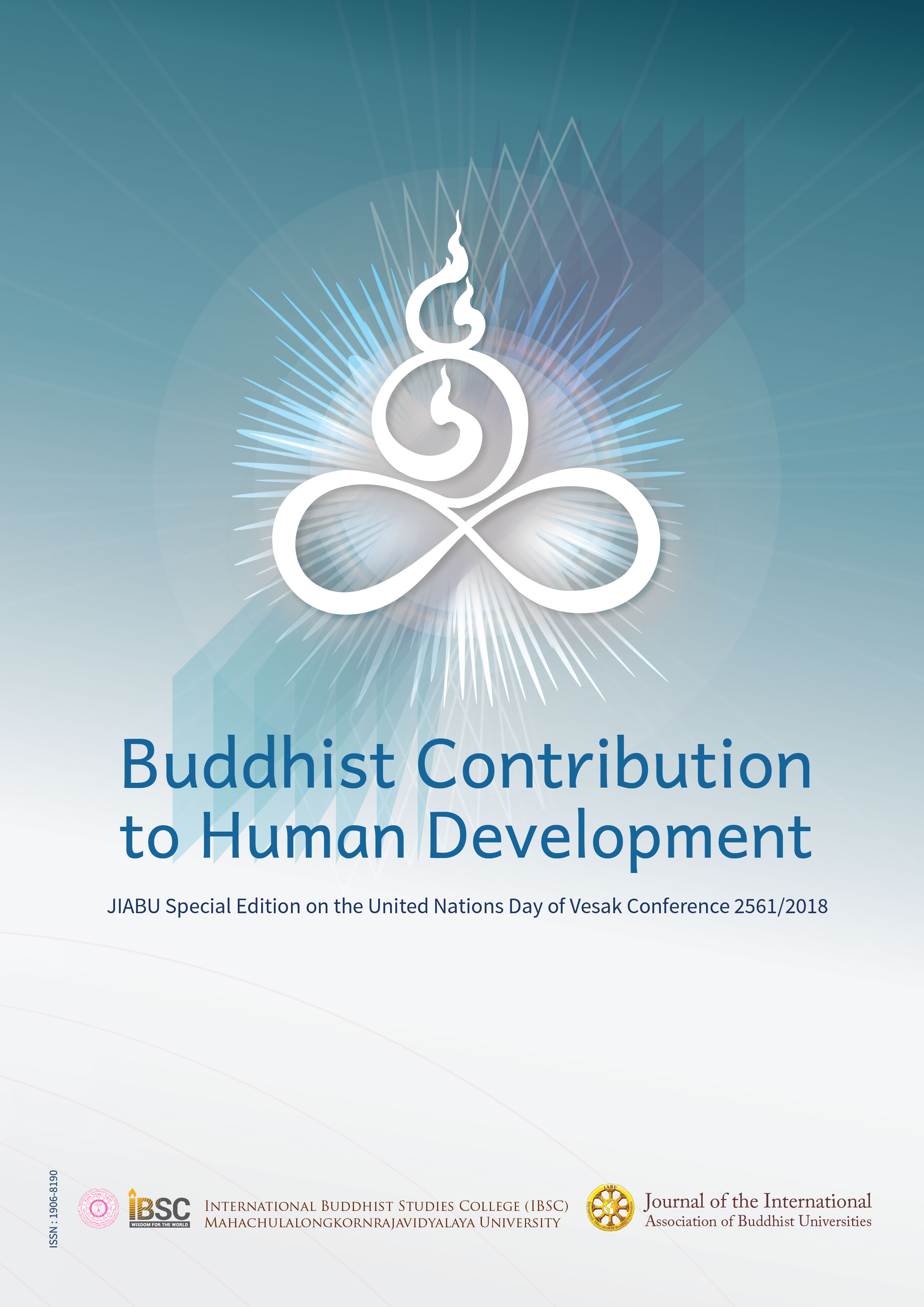An Analytical Study of Āyu and Causes Leading to Its Deterioration and Prosperity in Buddhist Scriptures
Main Article Content
Abstract
Bhutan, having been the Vajrayana Buddhist Kingdom since the 8th century, has been
greatly shaped in the light of governance, culture, and lifestyle. The Buddhist influence on
human development in Bhutan has come from two sources: governance and leaders. The
exemplar of a Buddhist monarch is the chakravartin, the universal wheel-turning king, an
inspiration among Bhutanese monarchs. The Ten Duties of the King are also applicable to
the leaders. A model Buddhist ruler is an agent of Avalokitesvara, the deity of compassion
and a leader is expected to possess three qualities, compassion, strength, and knowledge. The
ultimate value of governance in Bhutan is happiness instead of material goal such as GDP.
Influenced by the Buddhist perspective that happiness should be built on wholesome mindful
life, the ideals of governance in Bhutan was formulated by the Fourth King as GNH, which
is a development framework applied to official plans and programs. Bhutan is launching
GNH business certification to be applied to business and corporations. Under the concept of
GNH, ecological integrity has also been highly emphasized. The Lord Buddha’s dharma
was ultimately about how human beings ought to live, which has been of direct relevance
to human development. The Lord Buddha’s teachings bout behavioral, verbal and mental
actions that would lead to happiness and wellbeing are the main basis of human development
in Vajrayana Buddhism. HDI prompted by the UN and Sufficiency Economy of Thailand,
similar to GNH, are also somehow related to human development with Buddhist concepts.
Article Details
Views and opinions expressed in the articles published by The Journal of the International Association of Buddhist Universities (JIABU), are of responsibility by such authors but not the editors and do not necessarily reflect those of the editors.
References
org/vesak2011/book/ vesak_day2010.pdf
80 percent of the Bhutanese are Buddhists. The rest are largely Hindus.
Data is from the 2015 GNH survey with a sample size of 8000.
For reforms and development since 1907 when the Bhutanese monarchy was established, see
Karma Ura. (2010). The leadership of the wise: Kings of Bhutan (2nd ed.).
See pp. 84-85 in Rahula, W. S. (2001). What the Buddha taught. Finland: WS Bookwell. (Original
work published 1959).
The Ten Duties of the King are charity, moral character, sacrifice for people’s welfare, integrity,
kindness, austerity, freedom from ill will, non-violence, patience, non-opposition to the will of people.
See pp. 84-85 in Rahula, W. S. (2001). What the Buddha taught. Finland: WS Bookwell. (Original
work published 1959).
Walter Michael L. (2009) Buddhism and Empire, The Political and Religious Culture of Early
Tibet (The Netherlands: Brill. In particular, see Chapter four, The intersection of religion and politics, pp.
215-259.
Karma Ura. (2017). The experience of gross national happiness as a development framework. In
S. Mitra, & H. Y. Jeong (eds.), Bhutan: New Pathways to growth. New Delhi: Oxford University Press.
HM King Jigme Khesar Namgyel Wangchuck. (2008). Convocation address at Kolkota University.
Accessed from hhtp://www.tsheringtobgay.com/monarchy/2010/leadership-of-the-self.html
Centre for Bhutan Studies & GNH. (2016). A compass towards a just and harmonious society:
2015 GNH survey report. Thimphu: Centre for Bhutan Studies & GNH.
Tshoki Zangmo, Karma Wangdi, & Jigme Phuntsho. (2018). GNH certification. Thimphu: Centre
for Bhutan Studies and GNH.
For a broader discussion on this, see Karma Ura. (2017). Valedictory address in International
conference on spirituality in management education, 30th June and 1st July 2017. New Delhi: Allied Publishers Pvt. Ltd.
See http://www.occupyforanimals.net/animal-kill-counter.html for such statistics. Accessed on
25.6.2017.
Singer, P. (1975). Animal Rights. The Definitive Classic of the Animal Movement. 40th Anniversary Edition (2015). UK: Open Roads Media, Oxford.
Department of Forests and Park Services. (n.d.). National forest inventory report: Stocktaking
nation’s forest resources (volume 1). Thimphu: Ministry of Agriculture and Forests.
Herschock, Peter D. (2006). Buddhism in the public sphere, reorienting global interdependence.
Oxford: Routledge. Pp.44-45.
Aris, Michael. (1990). Man and Nature in the Buddhist Himalayas in Himalayan Environment
and Culture (Ramble C. and Rustomji, N. K. (eds.). Delhi: Indus. Pp. 85-101.
Smith, D. & Whitaker, J. (2016). Reading the Buddha as a philosopher. Philosophy East and
west, 66, 515-538. p. 529.
Loy, D. (2008). Money, sex, war, karma, Notes for a Buddhist revolution. Boston: Wisdom
Publications.
UNDP. (1993). Human Development Report. New York: UNDP. p. 10.
Karma Ura. 1993. Three Components of HDI, A review of Human Development Report,
1993.
Broderick, Richard. (2013). King by Virtue Reflections on the Life-long Endeavour of King
Bhumibol of Thailand. Bangkok: The Thai Khadi Research Institute. Pp. 200-205.


